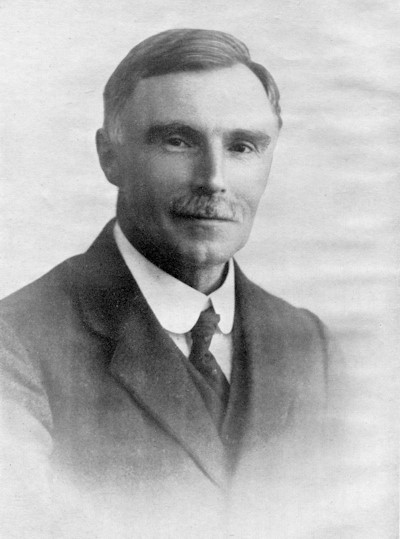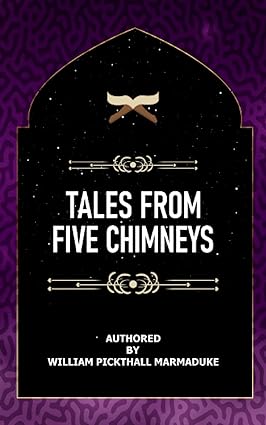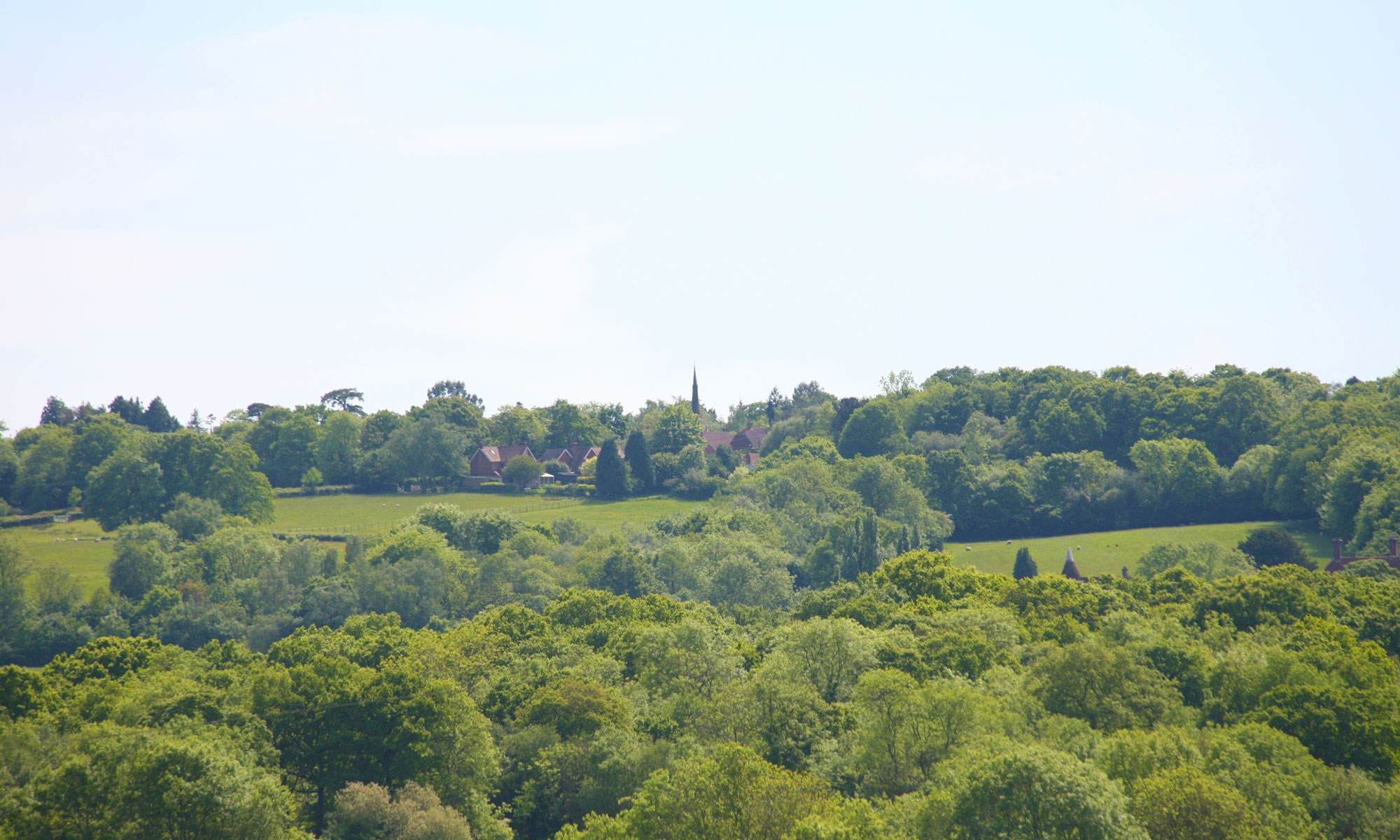Muhammad Marmaduke Pickthall 1875 – 1936
 Muhammed Marmaduke Pickthall lived in Five Chimneys, Hadlow Down between 1909 and c.1916/17. Electoral Roll records of 1912 show him owning one quarter of the C16 wood framed house now re-fronted with red brick and the central chimney stacks cemented over but finished with brick tops
Muhammed Marmaduke Pickthall lived in Five Chimneys, Hadlow Down between 1909 and c.1916/17. Electoral Roll records of 1912 show him owning one quarter of the C16 wood framed house now re-fronted with red brick and the central chimney stacks cemented over but finished with brick tops
Pickthall was born in Cambridge Terrace, near Regent’s Park in London on the 7th. April 1875 the elder of the two sons of the Reverend Charles Grayson Pickthall (1822–1881) and his second wife, MaryHale, née O’Brien (1836–1904). Mary, of the Irish Inchiquin clan, was the widow of William Hale and the daughter of Admiral Donat Henchy O’Brien, who served in the Napoleonic Wars, Charles was an Anglican clergyman, the rector of Chillesford a village near Woodbridge, Suffolk The Pickthalls traced their ancestry to a knight of William the Conqueror, Sir Roger de Poictu, from whom their surname derives.
Marmaduke was an English Islamic scholar noted for his 1930 English translation of the Qu’ran, (usually anglicized as “Koran” in Pickthall’s era). His translation is one of the most widely known and used in the English-speaking world. A convert from Christianity to Islam, Pickthall was also a novelist, esteemed by D. H. Lawrence, H. G. Wells, and E. M. Forster, as well as journalists, political and religious leaders. He declared his conversion to Islam in dramatic fashion after delivering a talk on ‘Islam and Progress’ on 29 November 1917, to the Muslim Literary Society in Notting Hill, West London.
Pickthall spent the first few years of his life in the countryside, living with several older half-siblings and a younger brother in his father’s rectory in rural Suffolk. He was a sickly child. When about six months old, he fell extremely ill of measles complicated by bronchitis. On the death of his father in 1881 the family moved to London. He attended Harrow School but left after six terms. As a schoolboy at Harrow, he was a classmate and friend of Winston Churchill.
Pickthall travelled across many Eastern countries, gaining a reputation as a Middle-Eastern scholar, at a time when the institution of the Caliphate had collapsed with the Muslim world failing to find consensus on appointing a successor. Before declaring his faith as a Muslim, Pickthall was a strong ally of the Ottoman Empire. He studied the Orient, and published articles and novels on the subject. While in the service of the Nizam of Hyderabad, Pickthall published his English translation of the Qu’ran with the title The Meaning of the Glorious Koran. The translation was authorized by the Al-Azhar University and the Times Literary Supplement praised his efforts by describing him “noted translator of the glorious Qu’ran into English language, a great literary achievement.”
of the Nizam of Hyderabad, Pickthall published his English translation of the Qu’ran with the title The Meaning of the Glorious Koran. The translation was authorized by the Al-Azhar University and the Times Literary Supplement praised his efforts by describing him “noted translator of the glorious Qu’ran into English language, a great literary achievement.”
Pickthall has often been described both by friends and enemies as a vehement Turcophile – a sentiment that had blossomed in a five-month period of time spent in Constantinople in 1913 which put him at odds with the British Government then preparing for war with Turkey. His spell at the centre of the disintegrating caliphate, described a year later in his book With the Turk In Wartime also consolidated his commitment to Islam. He became one of a number of Anglo-Ottoman sympathisers who drew the attention of the British security services. The authorities made sure that he was blocked from being offered a job with the Arab Bureau in Cairo (which given his expertise, should have been his), the post instead going to TE Lawrence; an appointment that subsequent events proved to have been a disaster for all concerned.
When Britain declared war on Germany in August 1914, Pickthall declared his willingness to be a combatant if he did not have to fight Turks and he argued strongly for respect for Turkish neutrality and independence. Due to the concerns of the security services Instead of being appointed to an officer position as an interpreter/negotiator he was eventually conscripted in the last months of World War I and became a corporal in charge of an influenza isolation hospital.
His book of short stories called ‘Tales From Five Chimneys’ was published in 1915. Disappointingly none of the ‘Tales’ are actually about Five Chimneys in Hadlow Down but in his introduction he included the following:
“It is very difficult to find a title suitable for a collection of stories which are diverse in scene and subject. After much consideration I can see no point which all the present stories have in common, except that, although most of them are the result of travel, all were written here at home. I therefore give to them the name of the old Sussex farmhouse [Five Chimneys] which has been my home in England for the last five years and dedicate them to the country neighbours who have made it dear to me.”
It was the English mood of holy war which finally drove him from the faith of his fathers. He had always felt uncomfortable with those English hymns that curse the infidel. One particular source of irritation was Bishop Cleveland Coxe’s merry song:
‘Trump of the Lord! I hear it blow!
Forward the Cross; the world shall know
Jehovah’s arms against the foe;
Down shall the cursed Crescent go!
To arms! To arms,
God wills it so.’
 And then, in a small Sussex village church, Pickthall heard a vicar hurling imprecations against the devilish Turk. (As Pickthall lived just a couple of hundred yards from St Mark’s in Hadlow Down and from the dedication of his book Tales From Five Chimneys to his neighbours in the village, some of whom would undoubtedly have attended the same church, the writer surmises that the church in question could well be St. Mark’s!).
And then, in a small Sussex village church, Pickthall heard a vicar hurling imprecations against the devilish Turk. (As Pickthall lived just a couple of hundred yards from St Mark’s in Hadlow Down and from the dedication of his book Tales From Five Chimneys to his neighbours in the village, some of whom would undoubtedly have attended the same church, the writer surmises that the church in question could well be St. Mark’s!).
The last straw was Charles Wesley’s hymn ‘For the Mahometans’:
‘O, may thy blood once sprinkled cry
For those who spurn Thy sprinkled blood
Assert thy glorious Deity
Stretch out thine arm thou triune God
The Unitarian fiend expel
And chase his doctrines back to Hell.’
In June 1917, Pickthall gave a speech defending the rights of Palestinian Arabs, in the context of the debate over the Balfour Declaration. In November 1917, Pickthall publicly took shahada* at the Woking Muslim Mission with the support of Khwaja Kamal-ud-Din. He followed this with a speech contrasting the Christian and Muslim approaches to religious law, arguing that Islam was better equipped than Christianity to handle the post-World War world. Pickthall, who now identified himself as a “Sunni Muslim of the Hanafi school”, was active as “a natural leader” within a number of Islamic organizations. He preached Friday sermons in both the Woking Mosque and in London.
In 1920 he went to India with his wife to serve as editor of the Bombay Chronicle, On the behest of Nizam of Hyderabad he was appointed Principal at Chadarghat High School in the Princely State of Hyderabad in 1926. The Nizam’s Government proposed to establish a Publicity Bureau in the Hyderabad State as it appeared in the Mushir-i-Deccan on 14 June 1931, that Marmaduke Pickthall is to be appointed Publicity Officer in addition to his own duties as Principal of the Chadarghat High School. Returning to England only in 1935, a year before his death at St Ives, Cornwall.
Admirers of his work were not only esteemed contemporary writers, on one of his regular shows Michael Parkinson was interviewing the late comedian and satirist Barry Humphries in his Dame Edna Everage alter ego. He asked Dame Edna who ‘her’ favourite writer was, and Dame Edna replied enthusiastically ‘Pickthall, Marmaduke Pickthall.’ One biographer describes Humphries as a ‘voracious collector of Pickthall manuscripts and ephemera.’
After his death in 1936 Pickthall was buried in the Muslim section at Brookwood Cemetery in Surrey, England.
The writer has found the researching of this mini biography incredibly interesting and would recommend reading further life articles as well as Pickthall’s books. Tales From Five Chimneys is available to download for free as an E-Book.

